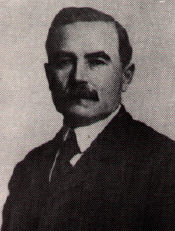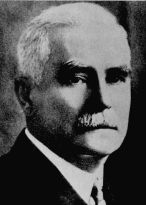|
Joseph S. Cullinan Pioneer In Texas Oil (1860 - 1937)
Born December 31, 1860, near Sharon, Mercer County, Pennsylvania, Joseph and Mary Considine Cullinan, both of whom were recent emigrants from County Claire, Ireland. They married at Dubuque, Iowa, in 1856, and moved to Sharon, Pennsylvania shortly thereafter. Joseph Cullinan attended public schools in Sharon, but at the age of fourteen he went to work in the oil fields. His responsibilities included messenger boy, oil wagon teamster, pipeline laborer, and drilling crew member, all of which gave him a wealth of practical experience in the oil industry. He learned the business literally from the ground up. In 1882 he joined the Standard Oil major transportation affiliate, Nation Transit Company of Oil City, Pennsylvania, and he advanced rapidly in that organization. His abilities were recognized by the key executive of Standard, and Cullinan was transferred in 1888 to Lima, Ohio, where he was appointed superintendent of the natural gas and tankage departments of the Buckeye Pipeline Company. While he was in Lima, Cullinan met and married Miss Luch Halm, daughter of a Lima merchant. To this union five children would be born; John Halm (1893); Craig Francis (1894); Nina Jane (1896); Margaret Ann (1898); and Mary Catherine (1901). Cullinan continued to move up Standard Oil's ladder, having been made division superintendent for another Standard Oil subsidiary, the Southwest Pennsylvania Pipeline Company of Washington, Pennsylvania. But in 1895 Cullinan left Standard Oil to organize
his own company, the Petroleum His early years as managing partner of Petroleum Iron Works were vital in the development of Cullinan's career. He gained further experience and self-confidence from the exercise of independent managerial authority. His travels for the company throughout the regions of Appalachia and the Middle West enabled him to make new contacts and to renew old friendships within the oil fraternity. He was involved in the design of the equipment sold by his company, giving him first hand knowledge of the problems and practices of different petroleum producing areas. Generally, his role in this company required him to make on-the-spot decisions so vital in highly competitive business situations. Obviously Joseph Cullinan was well qualified to meet the challenge presented to him by a group of Corsicana businessmen interested in developing their newly found oil deposits. Corsicana, founded in 1848, like dozens of other communities in the rich black-belt agricultural territory of North Central Texas, relied almost exclusively on cotton for its economic livelihood. Railroads had come in the 1870's bringing professional and mercantile groups to the community. Times were good through the '80s but the prolonged agricultural depression of the 1890's hit rock bottom in 1894 when cotton prices his a low of 4 1/4 cents on the Dallas Cotton Exchange. Corsicana's civic leaders, concerned with the situation, determined that something must be done to solve the problem of a one-staple economy. In 1894 the Corsicana Commercial Club was organized for the expressed purpose of attracting new industry to the community. While the city had several advantages, there was one obvious shortcoming: the town's water supply was hopelessly inadequate for industrial purposes. The first goal of the Commercial Club was to resolve that problem. To do so, the Corsicana Water Development Company was chartered. That company negotiated a contract with the American Well and Prospecting Company, an enterprise composed of H. G. Johnston, Emlin Akin and Charles Rittersbacher, iternerant well drillers. The contract called for the drilling of three artesian wells within the city limits of Corsicana. James Autry, president of both the Commercial Club and the Water Development Company, boldly and confidently predicted that the three wells, when completed, would have a total daily flow of 750,000 gallons. No pumping installations would be necessary since there was sufficient natural pressure to fill standpipes and storage tanks. Work began on the first of the wells in the spring of 1894 on South Twelfth Street near the Cotton Belt Railroad. On June 9, drilling had reached a depth of 1,035 feet when crewmen noticed crude oil filling the shaft and rising to the surface. Efforts to seal off the crude oil from the shaft proved unsuccessful, as it saturated the ground surrounding the drilling site. Workmen constructed a ditch for the purpose of running off the oil seepage to an earthen tank nearby. As estimated 150 gallons of crude flowed daily into the tank as drilling continued to complete the originally intended water well.
|
 With the discovery of oil in
With the discovery of oil in  Iron Works, specializing in fabrication and erecting steel
storage tanks and steam boilers. Despite the stiff competition of the storage tank
business, Petroleum Iron Works was a profitable venture for Cullinan and the six partners
who had backed the effort.
Iron Works, specializing in fabrication and erecting steel
storage tanks and steam boilers. Despite the stiff competition of the storage tank
business, Petroleum Iron Works was a profitable venture for Cullinan and the six partners
who had backed the effort. John Stephen Cullinan's biography,
JOSEPH STEPHEN CULLINAN:
A STUDY OF LEADERSHIP IN THE TEXAS PETROLEUM INDUSTRY, 1897-1937,
was published in
1974 by Vaderbuilt Press.
John Stephen Cullinan's biography,
JOSEPH STEPHEN CULLINAN:
A STUDY OF LEADERSHIP IN THE TEXAS PETROLEUM INDUSTRY, 1897-1937,
was published in
1974 by Vaderbuilt Press.